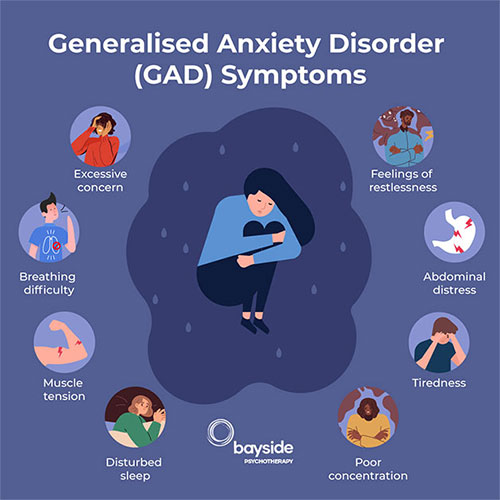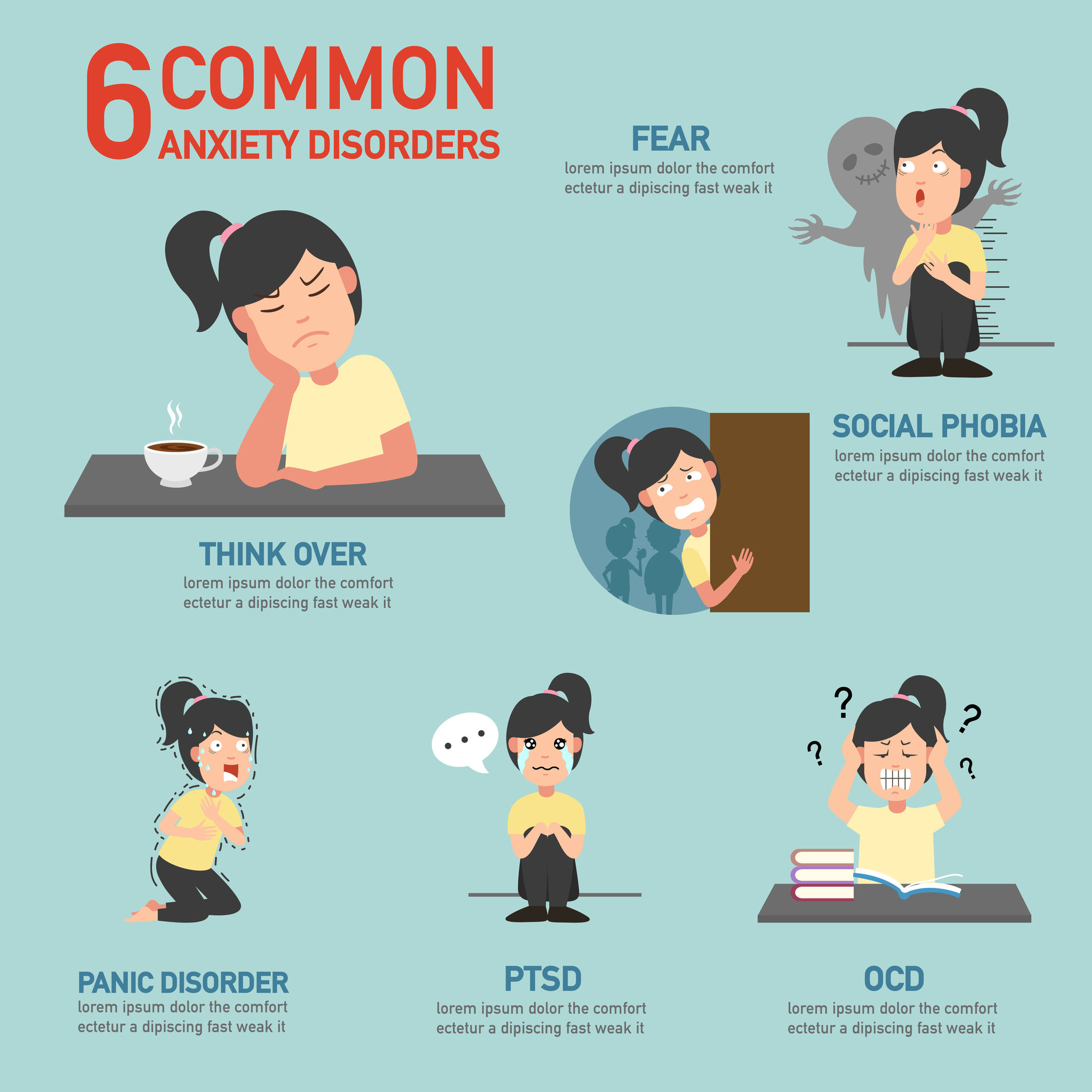Individual counselling for anxiety sessions that truly help
Individual counselling for anxiety sessions that truly help
Blog Article
Exploring Different Methods in Therapy for Stress And Anxiety Condition for Long-term Adjustment
When taking on anxiousness disorders, it's vital to discover a range of counseling methods. Each technique uses special understandings and tools to assist you manage your signs efficiently. You may discover that combining techniques can yield the most effective results. Understanding the subtleties of these approaches is vital to cultivating enduring modification. What if the best combination could launch a brand-new degree of emotional well-being for you?
Recognizing Stress And Anxiety Disorders: A Short Summary
Anxiety problems, which influence countless individuals worldwide, can substantially affect every day life. You might experience frustrating sensations of worry or worry that seem uncontrollable. These sensations can cause physical signs like an auto racing heart, sweating, or also lightheadedness. Typical sorts of anxiousness conditions include generalised anxiousness condition, panic disorder, and social anxiety problem. Each has special indications, but they all share a propensity to disrupt your routine and relationships.Understanding the origin of your anxiousness is crucial. It might come from genetics, brain chemistry, or life experiences. Identifying your triggers can assist you handle your reactions much better. It is essential to keep in mind that you're not the only one in this battle. Lots of individuals deal with comparable challenges, and looking for help is a solid step towards feeling better. By learning more about anxiety problems, you're already on the path to understanding and handling your condition a lot more efficiently.
Cognitive-Behavioral Treatment: Testing Unfavorable Idea Patterns
In Cognitive-Behavioral Treatment, you'll begin by recognizing the unfavorable thought activates that add to your anxiety. When you identify these ideas, you'll work with changing them with even more positive options. With each other, you'll construct effective coping techniques to assist manage your stress and anxiety in daily scenarios.
Identifying Unfavorable Idea Triggers

Recognizing the certain triggers behind your adverse thoughts can be vital in handling stress and anxiety when you come across minutes of distress. Begin by paying focus to situations that provoke feelings of concern or concern. Is it a crowded space, a forthcoming target date, or a discussion with specific people? Write down these instances in a journal. This will help you recognize patterns in your reasoning. Notification physical feelings that accompany your negative ideas, like a racing heart or rigidity in your breast. By pinpointing these triggers, you obtain understanding into what's sustaining your stress and anxiety. Comprehending these links is the very first step in testing those ideas and inevitably gaining back control over your emotional feedbacks.
Changing Ideas With Positives
Challenging adverse idea patterns is a necessary action in transforming your mindset and minimizing anxiousness. You may commonly find yourself caught in cycles of insecurity or catastrophic thinking. Rather of allowing these ideas dictate your feelings, method changing them with sensible choices or favorable affirmations. For instance, when you think, "I can't manage this," change it to, "I can take care of challenges one action at a time." This easy modification can considerably influence your psychological state. On a regular basis recognizing and responding to these adverse thoughts helps create a healthier interior dialogue. Keep in mind, it requires time and initiative, yet continually exercising this method can bring about lasting change, empowering you to face anxiety with renewed self-confidence and resilience.
Structure Coping Techniques With Each Other
Changing adverse ideas is just the beginning of managing anxiousness successfully. To produce long lasting modification, you need to build coping strategies that encourage you. Cognitive-Behavioral Therapy (CBT) aids you recognize and test those purposeless thought patterns. Together, you and your therapist can discover how these ideas influence your feelings and behaviors.Start by developing practical strategies, like journaling or mindfulness exercises, that allow you to challenge stress and anxiety head-on. When you face your fears progressively, you'll discover to respond differently.

Mindfulness and Acceptance-Based Approaches: Cultivating Present-Moment Recognition
As you navigate the intricacies of anxiety, integrating mindfulness and acceptance-based approaches can substantially enhance your capacity to cultivate present-moment understanding. By concentrating on the present moment, you'll find that you can observe your thoughts and sensations without judgment (Counseling services for anxiety). This practice helps you recognize your anxiety without feeling overwhelmed by it.Engaging in mindfulness exercises, such as deep breathing, body scans, or directed meditations, permits you to ground yourself in your existing experience. Acceptance-based strategies urge you to embrace your feelings rather than battle versus them. They lose their power over you.Incorporating these methods right into your daily routine can change just how you react to anxiety when you accept your feelings. You'll create durability and discover to browse stressful circumstances with higher convenience. Inevitably, growing present-moment awareness lays the foundation for long lasting modification, encouraging you to lead a more fulfilling life
Direct Exposure Therapy: Facing Anxieties Gradually
Exposure therapy assists you challenge your fears in a gradual method, making it much less overwhelming. You'll learn strategies to face anxiety-provoking situations detailed, while likewise building coping techniques to handle your responses. This approach equips you to take control and reduce stress and anxiety with time.
Steady Direct Exposure Techniques

When encountering anxiousness, slowly facing your fears can be an effective way to reclaim control. This method, called gradual direct exposure, entails slowly revealing yourself to the scenarios or objects that cause your anxiety. Begin with less challenging scenarios and progressively function your method up to even more difficult ones. If you're afraid of public talking, you might start by talking in front of a mirror, after that advance to sharing thoughts with a friend, and eventually address a small group. Each action assists desensitize you to the fear, building your self-confidence in time. Bear in mind, it's necessary to pace yourself and commemorate tiny victories as you move with this procedure, reinforcing your capability to handle anxiousness efficiently.
Structure Coping Strategies
Building efficient coping methods is essential for handling stress and anxiety, specifically as you confront your concerns progressively - Counseling services for anxiety. One effective method is exposure therapy, where you start by facing your fears in a controlled fashion. Start with much less frightening situations and slowly work your way as much as even more tough scenarios. This gradual exposure assists desensitize you to anxiousness causes, making them much less overwhelming.Incorporate leisure techniques, such as deep breathing or mindfulness, to relax your mind throughout exposure. Track your development, commemorating small triumphes along the road to enhance your self-confidence. Bear in mind, it's all right to take your time; the objective isn't excellence but constant renovation. By constructing these approaches, you'll equip yourself to navigate anxiousness and welcome life much more completely
Psychodynamic Therapy: Revealing Origin Causes of Anxiety
Psychodynamic treatment checks out the unconscious mind, disclosing the origin causes of your anxiousness. By analyzing your thoughts, sensations, and previous experiences, this method aids you discover underlying conflicts and unresolved concerns that might contribute to your current anxiousness. You'll collaborate with a therapist to investigate childhood years experiences, relationships, and emotional patterns that form your actions today.As you get insight into these much deeper layers of your psyche, you'll start to identify exactly how past events affect your present actions. This understanding can result in catharsis, permitting you to process emotions you may have suppressed.Through the therapeutic connection, you can also determine defense reaction that might have developed gradually, providing a more clear path to transform. Ultimately, psychodynamic treatment furnishes you with the devices to address your anxiety at its core, advertising lasting transformation in your psychological well-being.
Integrative and Alternative Techniques: Incorporating Techniques for Greater Efficacy
Incorporating various restorative strategies can enhance your journey towards taking care of stress and anxiety extra successfully. By combining components from cognitive-behavioral treatment, mindfulness methods, and holistic strategies, you can produce a customized method that addresses your one-of-a-kind needs. For example, you may utilize cognitive-behavioral strategies to test adverse idea patterns while incorporating mindfulness exercises to ground yourself in the here and now moment.Additionally, checking out alternative methods such as yoga or meditation can promote relaxation and decrease stress and anxiety signs. This mix permits you to create higher self-awareness and resilience.Experimenting with these diverse methods can help you discover what reverberates most with you. Bear in mind, it has to do with locating a synergy that works, rather than staying with a single method. This integrative strategy not only supplies prompt alleviation however likewise promotes long-lasting skills for managing anxiousness, equipping you to reclaim control over your life.
The Duty of Assistance Systems: Structure Durability Through Link
While it may seem that taking care of anxiousness is a singular journey, having a strong assistance system can play an important role in your strength. Surrounding yourself with compassionate good friends, household, or support groups produces a risk-free area where you can openly share your sensations and experiences. When you attach with others, you remind on your own that you're not the only one in this struggle.These partnerships use encouragement and can supply practical coping approaches that have functioned for others. It's additionally a possibility to obtain perspective; friends can assist you see scenarios in a different way, lowering feelings of isolation.Moreover, emotional assistance fosters a sense of belonging, which can considerably alleviate stress and anxiety signs and symptoms. By leaning on your support system, you can develop resilience and take on obstacles a lot more successfully. Keep in mind, reaching out for help suggests toughness, and it can make all the distinction in your journey toward taking care of stress and anxiety.
Often Asked Inquiries
What Are the Usual Symptoms of Anxiety Conditions?
You may experience uneasyness, tiredness, problem focusing, impatience, muscular tissue stress, and rest disruptions. Physical symptoms can consist of rapid heartbeat, sweating, and trembling. Recognizing these signs early can assist you look for appropriate support and treatment.
Exactly How Long Does Therapy Commonly Last for Anxiousness Problems?
Treatment for stress and anxiety conditions normally lasts anywhere from a couple of weeks to a number of months. It truly depends upon your individual needs, development, and the techniques your specialist makes use of to help you manage your stress and anxiety successfully.
Can Drug Be Made Use Of Alongside Treatment for Anxiety?
Yes, medicine can most definitely be used along with treatment for stress and anxiety. Incorporating both approaches commonly boosts therapy efficiency, helping you manage signs and symptoms while checking out underlying issues via therapy (Counseling services for anxiety). Constantly consult your medical care copyright for tailored recommendations
Are There Self-Help Strategies for Taking Care Of Anxiousness?
Yes, there are several self-help approaches for handling anxiety. You can exercise mindfulness, engage in normal exercise, keep a balanced diet regimen, establish a regular, and use deep breathing techniques to help in reducing stress and anxiety symptoms properly.
Exactly how Do I Know if I Required Professional Aid for Stress And Anxiety?

Report this page